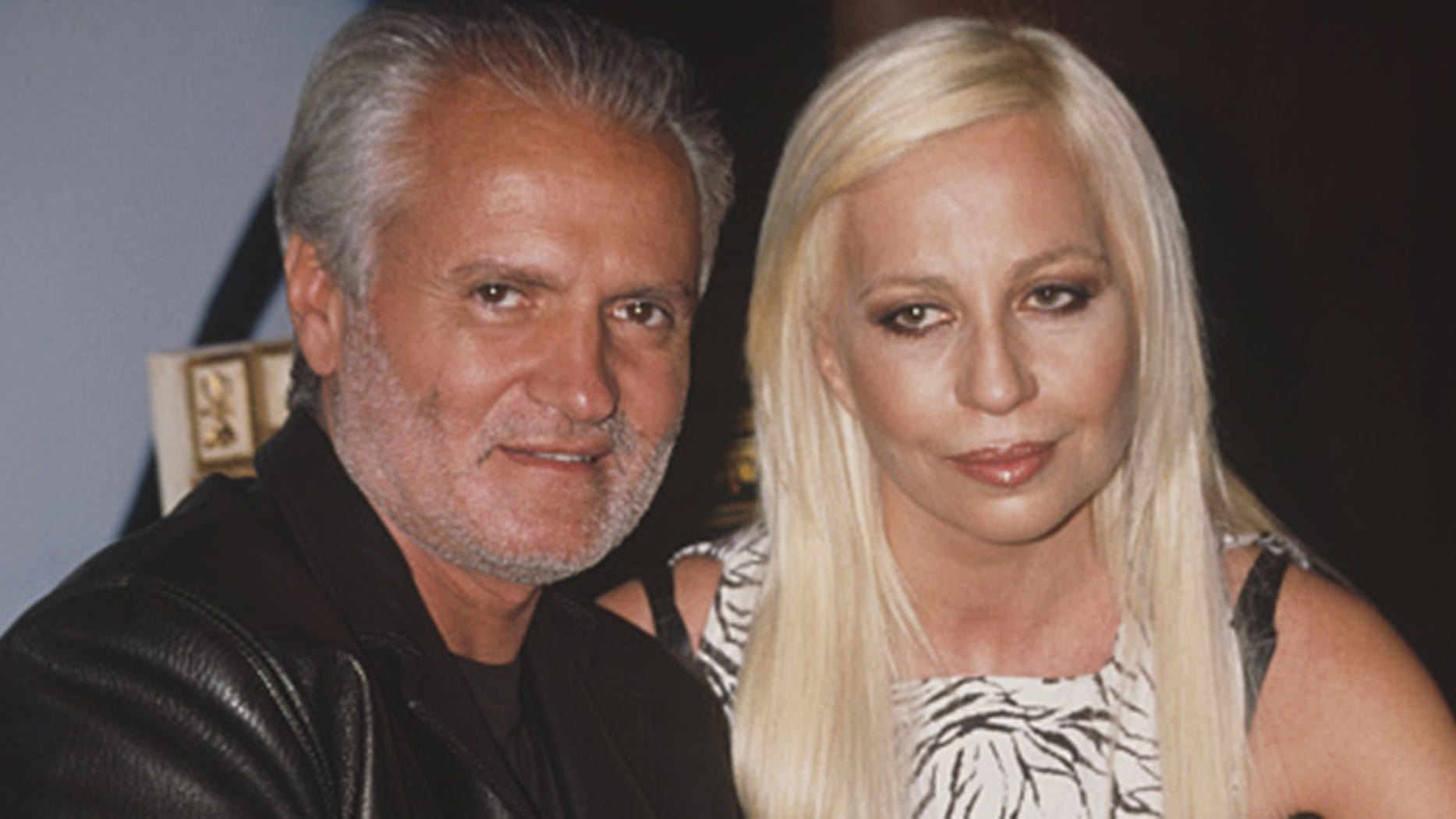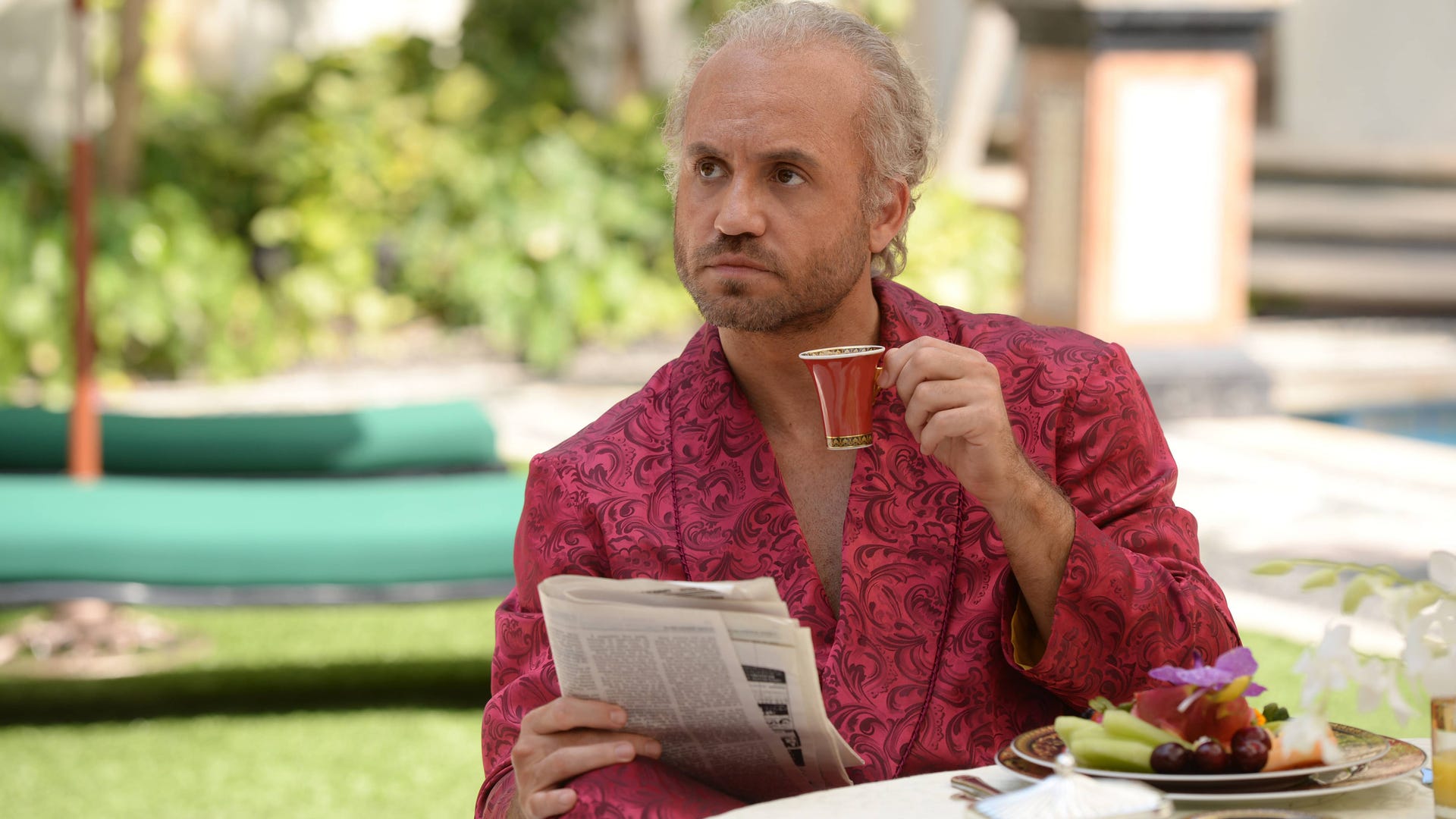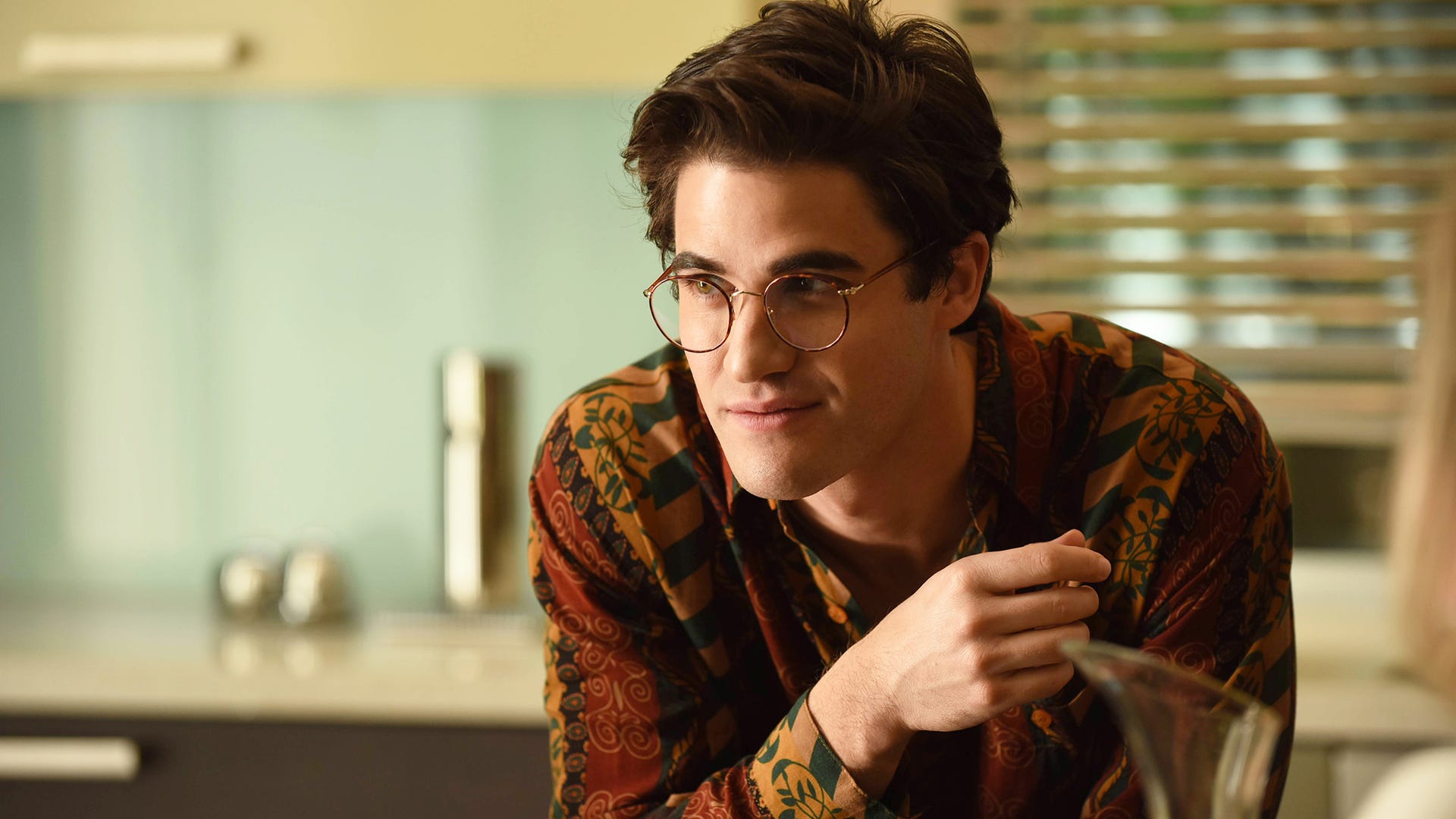Join or Sign In
Sign in to customize your TV listings
By joining TV Guide, you agree to our Terms of Use and acknowledge the data practices in our Privacy Policy.
Why The Assassination of Gianni Versace Will Be Ryan Murphy's Masterpiece
Ryan Murphy is the only showrunner who could tell this story
In the first episode of FX's The Assassination of Gianni Versace: American Crime StoryVersace's (Edgar Ramirez) partner Antonio D'Amico (played by Ricky Martin) is grilled by an investigator who's totally clueless about the icon murdered moments ago. Who was he, really? the investigator wants to know. D'Amico, his white shirt stained with the blood of his partner, musters, "He was a genius."
He was, but "genius" doesn't fully convey the enormity of Versace's thinking, or his impact. Gianni Versace rose from opening a small Milan store in 1978 to being a fashion, media and branding virtuoso with an empire worth $807 million by the time he was murdered in 1997. As much as he shaped those worlds, his story may seem like a puzzling choice for Ryan Murphy's next American Crime Story after the seismic shifts of The People v. O.J. Simpson. Whereas the O.J. story divided America along racial fault lines, Versace's murder (by a gay man on a killing spree no less) didn't have the same impact to people outside the insular, elite realms of fashion and media. But if there's one thing Ryan Murphy loves, it's the element of surprise, and stories with high octane-impact. And while Versace's murder is a heinous injustice on its own, Murphy took on this story because it has implications bigger than a celebrity's death. American Crime Story: The Assassination of Gianni Versace is Murphy's way of demanding accountability, of forcing the public to understand that the brutal slaying of one of the world's greatest talents was due to deeply ingrained anti-gay discrimination within law enforcement and society as a whole.

Gianni Versace and Donatella Versace
Rose Hartman, Getty Images"People often ask us if we're going to do JonBenét Ramsey," executive producer and frequent Murphy collaborator Alexis Martin Woodall told TV Guide. "It's a big crime but it doesn't have larger implications. We always have to have a social context. I think it's really important to shine the light on the world FBI's largest failed manhunt and why that happened." That's why this iteration of American Crime Story has "assassination" in the title: it chronicles how homophobia ended the life of one of the world's greatest talents. Entrenched homophobia caused local police teams to bungle investigations of Andrew Cunanan (played by Darren Criss) as he killed his first victims in Minnesota and Chicago. It's also why the FBI botched its manhunt in spite of generous evidence, clues and tips. And internalized homophobia is certainly why the gay community itself downplayed the fact a gay killer was on the loose, afraid of making gay people look bad.
Yes, Versace's murder was a high-profile crime. But what should have been a watershed moment to look at how bias let a madman murder five people, including Versace, went to waste because the mostly closeted gay community was afraid (understandably) of the attention Cunanan's sexuality would foist upon them. Twenty years later, the prolific showrunner is getting justice. Because of his need to correct the record, their shared sensibilities and his singular penchant for visual razzle-dazzle, Murphy is the only TV producer who can give Versace's death as much meaning as his life. Unsurprisingly, it's also his best work yet.
"Dramatic, emotional, brash -- big primary colors of emotion and subtlety," is how Tim Minear an executive producer who's worked with Murphy on AHS and Feud: Bette and Joan, described the House of Murphy sensibility to TV Guide. "Pushed," is another word he uses frequently. It's a nebulous term, but one that makes sense to anyone who's been yanked through the screen by Murphy's heightened sense of, well, everything in his shows, whether it's a chorus of gay schoolboys signing Katy Perry on Gleeor Chaz Bono hacking off his hand in Horror Story.
The Assassination of Gianni Versace: Ricky Martin's Covered in Blood in the First Footage!

Edgar Ramirez as Gianni Versace, The Assassination of Gianni Versace: American Crime Story
FXMurphy and Versace don't make the same products, obviously, but fundamentally, they create the same effect: baptism into a world of media obsession, celebrity worship, glamour, filth and sex. "I think it's the responsibility of a designer to break rules and barriers," Versace once said, and he lived it. Versace bucked fashion rules that said expensive clothes were supposed to look refined. He borrowed from taboo subcultures -- punk, bikers, sex workers -- and made dresses that were loud and risqué, purposefully showing too much skin or too much pattern, to upend ideas of good taste. He also single-handedly rebranded Miami, where he created an opulent mansion, as a destination for beautiful jet-setting people. He practically created "supermodels" -- Naomi Campbell was his main muse -- and, as the first to deliberately place celebs like friends Prince and Madonna in the front row of his shows, he pioneered the idea that fashion could mean celebrity, rock & roll and sex.
He was openly gay, a rarity in the days when "Don't Ask Don't Tell" was supposed to be progress but barred gay people in the military from speaking about their personal lives. Being out was so rare and risky for a public figure then -- yup, even for a fashion designer -- that in April 1997, just months before Versace died, Ellen DeGeneres came out and saw her sitcom canceled and career stalled for years. Versace was a rebel. Versace invented giving zero f--s. Just as Versace didn't simply make clothes but rather, a feeling, Ryan Murphy doesn't make TV as much as he makes commentary. Nineteen years younger than Versace, Murphy also comes from humble beginnings (working class Indianapolis) and cut his teeth writing about entertainment for glossy pop culture magazines. Then he started creating pop culture himself, first with Popular, thenNip/Tuck, Glee, Scream Queens, the AHS series, The People v O.J. Simpson andFeud. Though every subject has been different, Murphy imbues every show with the same principles of contradictory emotion and images that leave viewers asking aloud and/or rewinding to see what the hell they just saw.

Darren Criss as Andrew Cunanan, The Assassination of Gianni Versace: American Crime Story
FXMurphy never hid his sexual orientation in his cutthroat industry, either. And just like Versace, Murphy's distinctly gay sensibility informs his shows as much as a queer point of view was imbued in Versace's clothes and casa. Their common language is camp, expressed through an innate instinct to provoke people with a patchwork of disparate, non-conformist influences. Gay men, particularly those of a certain age who endured hardships of yore, are unmatched in their ability to merge the sad, beautiful, profane, holy and hilarious in a single sentiment. If anything unites Murphy's wildly different works, it's delighting in the mix. Their end products aren't the same, but Murphy and Versace are cut from the same cloth.
Andrew Cunanan, on the other hand, was the shadow image of the two. Using the thoroughly researched book Vulgar Favors: Andrew Cunanan, Gianni Versace, and the Largest Failed Manhunt in U.S. History as its bible, the FX series depicts how Cunanan had all the desire to be as prominent as Versace or Murphy but did nothing to accomplish it other than lie and con. Versace and Murphy achieved success with endless hours of work and sacrifice, but Cunanan just earned the tokens of it -- cash, clothes, drugs -- through manipulation and sinister deception. And where Versace and Murphy boldly confronted homophobia by being out and outspoken, Cunanan succumbed to it by lying and pretending to be somebody else, so much that nobody who knew him really knew who he was. He killed his closest friends in egomaniacal tantrums; Cunanan shot Versace because he represented what Cunanan could've been, and what he felt he deserved. He wanted to be famous. "The most ironic thing of all," Alexis Martin Woodall said, "is that he wanted to be remembered and nobody remembers who he was. Everybody thinks fame is the answer and for most people, fame is totally destructive."
Murphy delights in showing monsters up close, as he does in American Horror Story, but he's most poignant when he probes how real-life monsters became that way. The Assassination of Gianni Versace allows Murphy to do what he does best: make viewers understand -- but not empathize -- with the devil. And only Murphy could achieve the delicate balance of vilifying a person without vilifying an entire culture -- exactly what kept the case from having the same kind of cultural impact that O.J. had. That long overdue impact can now finally occur in Murphy's dramatic retelling.

Penelope Cruz as Donatella Versace, The Assassination of Gianni Versace: American Crime Story
FXMurphy directed the first episode of Versace and, as everyone knows, he never shies away from brutal images. The season opener goes back to Versace's face, ripped open by the stolen .40 caliber semiautomatic Cunanan used, several times in the hospital and autopsy room. It is gruesome and haunting, yet fitting. Versace made Medusa, the mythological monster with a head full of snakes, his logo; he saw the beauty in the grotesque and knew that shock had value. Murphy has made those elements hallmarks, using them as Trojan horses to make points about racism (O.J.), sexism (Feud) and now, homophobia, a subject that's obviously personal. In the years since Versace's demise, many groups and museums -- and even his sister Donatella (portrayed in the FX series by her friend Penelope Cruz) -- have honored Versace's legacy. But 20 years after Versace's death, Ryan Murphy has created a work that not only pays respects to the legendary designer but channels righteous anger at the institutions that robbed the world of a master whose sole life purpose was to create beauty, fun and love. And he manages to do it in a way that doesn't shy away from the fact that Versace's killer was cut from what Cunanan considered to be the same cloth. The result is a series so intense that even the cast and crew cried while shooting.
"The word genius is overused," said Woodhall. "Except with Ryan. He really is a genius. He is a visionary."
The Assassination of Gianni Versace: American Crime Story premieres Wednesday, Jan. 17 at 10/9c on FX.
